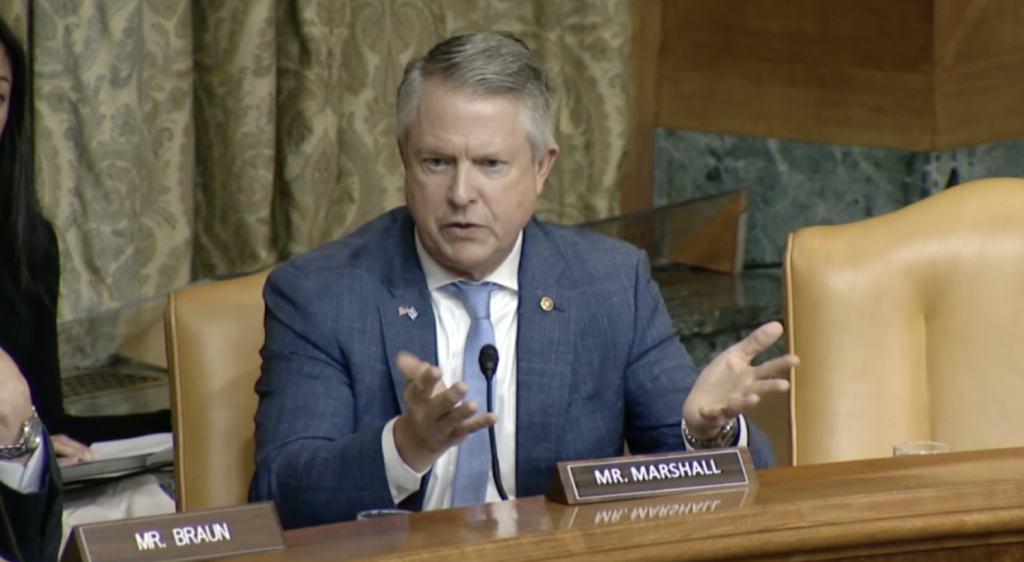- October 24, 2023
ICYMI: Senator Marshall Addresses Excess Health Care Costs At Budget Committee Hearing
Washington, D.C. – U.S. Senator Roger Marshall, M.D., a member of the Senate Budget Committee, participated in the hearing, Improving Care, Lowering Costs: Achieving Health Care Efficiency. Senator Marshall questioned witnesses on health care spending and discussed ways to find reasonable solutions to improve quality access to care in a financially responsible way. He focused on his bipartisan legislation to modernize prior authorization, expand primary care, and increase hospital competition.
Witnesses testifying included Dr. Leemore Dafny, Professor of Business Administration at the Harvard Business School; Dr. Al Kurose, President and CEO of Coastal Medical; Dr. Matthew Fiedler, Senior Fellow in Economic Studies at the Brookings Institution; Dr. Merkel, Director of the Private Health Reform Initiative and Senior Research Fellow for the Paragon Institute and a Senior Fellow at the Manhattan Institute; and Dr. White, Director of Health Analysis at CBO.

You may click HERE or on the image above to watch Senator Marshall’s full remarks.
Highlights from Senator Marshall’s questioning are below.
On Modernizing Prior Authorization:
Senator Marshall: What is the prior authorization impact, you think about health care expenses? Does it actually slow down? Does it make it worse? Any thoughts on prior authorization?
Dr. Matthew Fiedler: So I think prior authorization is very much a two edged sword. On the one hand, I think exactly what you’re talking about. It can create a lot of administrative hassle for providers, but frankly, for patients as well. Right, if you’re the patient in that situation where the prior authorization has come through, that’s a very real burden. I think the flip side of this is there are cases where prior authorization is used appropriately, and we have evidence that it meaningfully reduces use of inappropriate services and therefore reduces claim spending and premiums and cost sharing for paper shades.
On Unleashing Physician-Led Hospitals:
Senator Marshall: I may be the only person in the Senate or in Congress that’s ran a hospital, owned a hospital, a private practice, oversaw health departments, I understand health care… I always thought to drive down the cost of health care, we needed more transparency, more innovation, and consumerism making patients consumers again, promoting competition, whether it’s insurance companies, or whether it’s hospitals, PBMs… So Mr. Merkel, what was your experience with physician-owned hospitals? And do you think that they will help drive the cost down or up at the end of the day?
Mr. Merkel: Thank you for your question, doctor. I think that you know, with fee for service reimbursement and our entitlement programs being basically unlimited, and how much taxpayer money that they will provide, you know, Congress, over the years has tied themselves into a lot of knots on how to try to protect taxpayers while in that system, and industry incumbents take advantage of those concerns, and will utilize those fears to try to block competition from things like physician on hospitals, or through certificate of need laws. I think both of those restrictions come from the same concern and demonstrate how industry incumbents basically use them to prevent competition.
On Prioritizing Primary Care:
Senator Marshall: Dr. White, what do you think about more primary care, how that would impact the cost of health care for this country?Dr. White: We have spoken to a number of experts about alternative payment models and ACOs. And they have pointed out that primary care is really central to ACOs in a very, kind of nuts and bolts sense to get patients attributed to an ACO, they have to be receiving primary care services. So that’s kind of foundational, but there’s also this phenomenon that physician led ACOs are clearly more successful in reducing spending than hospital that ACOs and what we’ve gathered is that physician led ACOs tend to focus on shifting care away from facility settings, specialty care imaging services. And so I think that’s generally consistent with what you’re saying.
